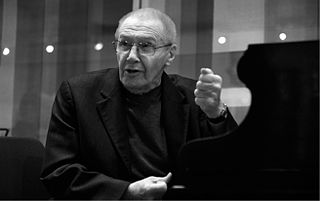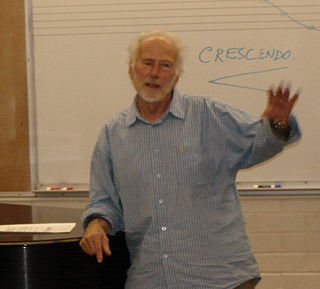
Heitor Villa-Lobos was a Brazilian composer, conductor, cellist, pianist, and guitarist described as "the single most significant creative figure in 20th-century Brazilian art music". Villa-Lobos has become the best-known South American composer of all time. A prolific composer, he wrote numerous orchestral, chamber, instrumental and vocal works, totaling over 2000 works by his death in 1959. His music was influenced by both Brazilian folk music and by stylistic elements from the European classical tradition, as exemplified by his Bachianas Brasileiras. His Etudes for guitar (1929) were dedicated to Andrés Segovia, while his 5 Preludes (1940) were dedicated to his spouse Arminda Neves d’Almeida, a.k.a. "Mindinha." Both are important works in the guitar repertory.

The music of Brazil encompasses various regional musical styles influenced by African, European and Amerindian forms. Brazilian music developed some unique and original styles such as forró, repente, coco de roda, axé, sertanejo, samba, bossa nova, MPB, música nativista, pagode, tropicália, choro, maracatu, embolada, funk carioca, frevo, brega, modinha and Brazilian versions of foreign musical styles, such as rock, soul, hip-hop, disco music, country music, ambient, industrial and psychedelic music, rap, classical music, fado, and gospel.

György Kurtág is an award-winning Hungarian classical composer and pianist. He was an academic teacher of piano at the Franz Liszt Academy of Music from 1967, later also of chamber music, and taught until 1993.

Júlio Medaglia is a Brazilian composer, arranger, and conductor. Born in São Paulo, he studied theory and conducting with Hans-Joachim Koellreutter. He continued his studies at the Musikhochschule in Freiburg, Germany, and privately with Pierre Boulez, Karlheinz Stockhausen, and Sir John Barbirolli, with whom he worked as assistant conductor.
Marlos Nobre is a Brazilian composer. He has received commissions from numerous institutions, including the Ministry of Culture in Spain, the Free University of Music of São Paulo, the Neuchâtel Chamber Orchestra in Switzerland, The Apollon Foundation in Bremen, Germany and the Maracaibo Music Festival in Venezuela. He has also sat on the juries of numerous international music competitions, including the Cità di Alessandria Prize and the Arthur Rubinstein Piano Master Competition.

João Bosco de Freitas Mucci, better known as João Bosco is a noted Brazilian singer-songwriter with a distinctive style as a guitarist. In the 1970s he established his reputation in música popular Brasileira alongside collaborator lyricist Aldir Blanc.
Cláudio Franco de Sá Santoro was an internationally renowned Brazilian composer, conductor and violinist.
Osvaldo Costa de Lacerda was a Brazilian composer and professor of music. Lacerda is known for a Brazilian nationalist musical style that combines elements of Brazilian folk and popular music as well as twentieth-century art music, as exemplified in the works of his teacher M. Camargo Guarnieri (1907–1997). His compositional output includes works for orchestra, choir, smaller vocal and instrumental ensembles, voice and piano, solo instrument and piano, solo piano, and other solo instruments. He received several musical awards during his lifetime, including the John Simon Guggenheim Memorial Foundation Fellowship, and contributed significantly to the training of younger musicians in Brazil as a professor of composition and theory, member of various musical organizations and societies, and author of textbooks for theory, ear training, and notation.
José María Sánchez-Verdú is a Spanish composer.

Toshio Hosokawa is a Japanese composer of contemporary classical music. He studied in Germany but returned to Japan, finding a personal style inspired by classical Japanese music and culture. He has composed operas, the oratorio Voiceless Voice in Hiroshima, and instrumental music.
Juan Trigos is a Mexican-American composer and conductor, with a career of over 25 years.

Graham Waterhouse is an English composer and cellist. For his own instrument, he composed a cello concerto and Three Pieces for Solo Cello. He has written string quartets and compositions which juxtapose a quartet with a solo instrument, including Piccolo Quintet, Bassoon Quintet and Rhapsodie Macabre. He has set poetry for speaking voice and cello, such as Der Handschuh, and has composed song cycles. His compositions reflect the individual capacity and character of players and instruments, from piccolo to contrabassoon.
Max Beckschäfer is a German organist, composer and academic.
Gerd Kühr, also Gerd Kuhr, is an Austrian conductor, composer of classical music and academic teacher. He is known for operas, such as Stallerhof on a libretto by the author of the play, Franz Xaver Kroetz, and film music including Schlöndorff's Eine Liebe von Swann.
Sandeep Bhagwati is a German composer of western classical music and an academic teacher.
Klaus Schedl is a German composer.
Lin Wang, is a Chinese composer. Lin Wang was born in Dalian, China, in 1976.
André Ricardo Mehmari is a Brazilian pianist, composer and arranger.

Uirapuru is a symphonic poem or ballet by the Brazilian composer Heitor Villa-Lobos, begun as a revision of an earlier work in 1917 and completed in 1934. A recording conducted by the composer lasts 20 minutes and 33 seconds.









